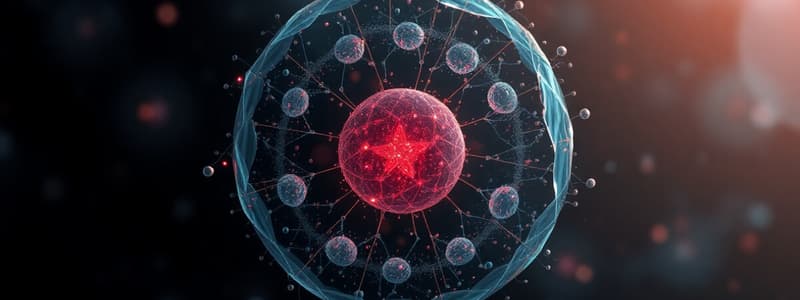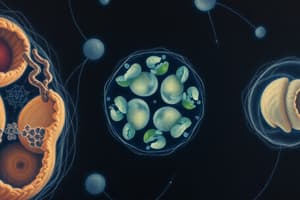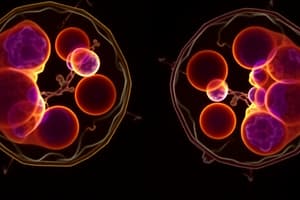Podcast
Questions and Answers
What happens during mitosis in terms of chromosome number?
What happens during mitosis in terms of chromosome number?
- The chromosomes are completely eliminated.
- The number of chromosomes is doubled.
- The number of chromosomes remains the same. (correct)
- The number of chromosomes is halved.
Which phase follows the Gap 1 phase in the cell cycle?
Which phase follows the Gap 1 phase in the cell cycle?
- G0 phase
- Meiosis
- Synthesis phase (correct)
- Gap 2 phase
What is a key result of meiosis compared to mitosis?
What is a key result of meiosis compared to mitosis?
- It occurs only in somatic cells.
- It produces cells that are identical to the parent cell.
- It results in genetically unique daughter cells. (correct)
- It has the same number of chromosomes as the parent cell.
Which of the following statements is true regarding the Gap 2 phase?
Which of the following statements is true regarding the Gap 2 phase?
Which types of cells do not undergo mitosis as mentioned?
Which types of cells do not undergo mitosis as mentioned?
Flashcards
Mitosis
Mitosis
Cell division where a single parent cell divides into two identical daughter cells, each containing the same number of chromosomes.
Meiosis
Meiosis
Cell division where a single parent cell divides into four daughter cells, each with half the number of chromosomes as the parent cell, leading to genetic variation.
G1 Phase
G1 Phase
The first phase of interphase, where the cell grows and prepares for DNA replication.
S Phase
S Phase
Signup and view all the flashcards
G2 Phase
G2 Phase
Signup and view all the flashcards
Study Notes
Cell Cycle
- The cell cycle is a series of events that take place in a cell leading to its duplication
- Interphase is the preparatory phase for cell division
- The interphase consists of three subphases
- G1 phase: Cell growth and organelles duplication; cell checks for proper growth and proper DNA
- S phase: DNA replication; DNA is checked to ensure no mistakes during replication
- G2 phase: final growth and checking for errors in DNA replication before mitosis
Mitosis
- Mitosis is a type of cell division that results in two genetically identical daughter cells
- Chromosomes replicate and condense into visible structures
- Prophase: Chromosomes condense, nuclear envelope breaks down, spindle fibers form
- Metaphase: Chromosomes line up at the cell's equator
- Anaphase: Sister chromatids separate and move to opposite poles
- Telophase: Chromosomes decondense; nuclear envelope reforms; spindle fibers disappear
Meiosis
- Meiosis is a type of cell division that produces four genetically unique daughter cells
- Meiosis involves two rounds of cell division
- Meiosis I: Homologous chromosomes pair up and separate
- Prophase I: Homologous chromosomes pair up and exchange genetic material (crossing over)
- Metaphase I: Homologous chromosome pairs line up at the cell's equator
- Anaphase I: Homologous chromosomes separate and move to opposite poles
- Telophase I: Chromosomes decondense; nuclear envelope may reform; spindle fibers disappear
- Meiosis II: Sister chromatids separate
- Prophase II: Chromosomes condense; nuclear envelope breaks down; spindle fibers form
- Metaphase II: Chromosomes line up at the cell's equator
- Anaphase II: Sister chromatids separate and move to opposite poles
- Telophase II: Chromosomes decondense; nuclear envelope reforms; spindle fibers disappear
- Result: Four genetically unique haploid daughter cells
Cell Cycle Regulation
- The cell cycle is controlled by internal and external signals to ensure accuracy
Cell Division Differences
- Mitosis: produces two genetically identical daughter cells to cell division
- Meiosis: produces four genetically unique daughter cells
- Meiosis reduces the chromosome number by half (haploid), whereas mitosis maintains the same number (diploid)
Studying That Suits You
Use AI to generate personalized quizzes and flashcards to suit your learning preferences.




